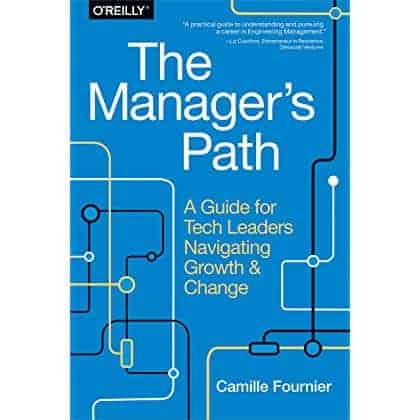Camille Fournier has a new book out all about how to be a great technical leader called, The Manager's Path. It's a great look at what you need to think about at every step in your career from first job to CTO of a growing organization.
Similar to John Wooden's book we recently highlighted takeaways from, this book is like having a series of coffees getting career advice from Fournier.

Stand on the shoulders of giants
One of the best ways to accelerate your career is to learn from others. Don't make rookie mistakes. Avoid them by learning from others.
There are many ways you can do that:
- Read: Learn from books, blog posts (like ours!), newsletters, etc from high quality sources.
- Mentors: Anyone a step ahead of you in their career can be a source of advice & experience.
- Observation: Pay attention to those around you and note what they do that seems to work and what doesn't.
The best is when you do all three.
When you mix and match all of them, you have context and are more likely to understand *why* something works or not. Understanding why then gives you a rule you can follow and apply to your emerging leadership style.
Today, we share a great book written in the tone and approach of an ongoing mentoring relationship with Camille Fournier. We've been a fan of her work for some time, as we've quoted her in a number of our past posts. In particular, this essential truth should be familiar if you're a regular Lighthouse reader:

Here's our favorite lessons you can apply:
- "One-on-one meetings with your manager are an essential feature of a good working relationship."
- "A manager's job involves making it easy for her employees to get things done..."
- "Mentoring new hires is critical."
- "Feedback works best when you, as a manager, pair that feedback with coaching."
- "It's unrealistic to think you can or should shield your team from everything."
5 Great Takeaways from Camille Fournier in The Manager's Path
Regardless of your degree in college, it's amazing how little it can prepare you for challenges you'll face in the workplace.
If you have a technical degree in particular, this can be especially jarring; working with other people, and moving into leadership requires an entirely different set of skills. As we've discussed many times before, it's a career change, not a promotion.
Here's a few key lessons to learn as you move in your technical career towards leadership roles and opportunities. (If you're non-technical, many of these still apply.)
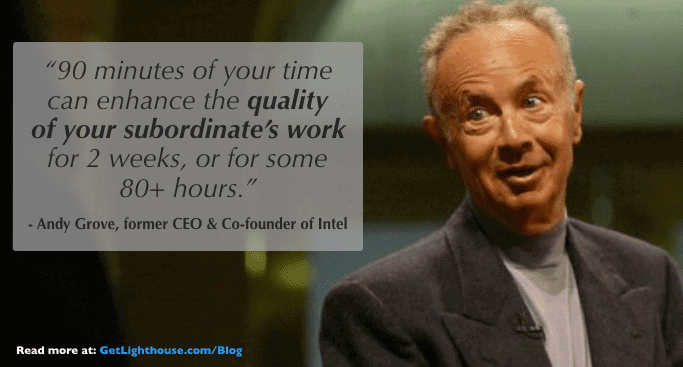
1) "One-on-one meetings with your manager are an essential feature of a good working relationship."
From the second page of her book, Camille Fournier starts preaching about the essential value of one on ones. It's something we strongly agree with her about.
She writes that there are two key purposes:
- Create a human connection between you and your manager. (Aka - Build rapport)
- Provide a regular opportunity for you to speak privately with your manager about whatever needs discussing.
Throughout the book she reinforces both of those concepts as key to effective leadership. If you don't have your one on ones, it's unlikely you'll have another time to coach, give feedback, have tough conversations, and maintain strong communication with your team.
Or put more simply in Camille Fournier's book when she quotes Marc Hedlund, senior director of engineering at MailChimp:
"Regular 1-1s are like oil changes; if you skip them, plan to get stranded on the side of the highway at the worst possible time."
And Fournier herself states unequivocally:
"Skipping 1-1s because you're too busy with other things is a great way to miss the warning signs of an employee who is going to quit."
Further reading:
- Check our handy 1-on-1 meeting template.
- Here are the best one on one questions to ask and topics to cover in your meetings.
- If you're looking for step by step help to starting and making your one on ones awesome, download our ebook here.

2) "A manager's job involves making it easy for her employees to get things done by creating fertile environments in which work can happen."
The decision to become a manager should not be taken lightly. Fournier reminds us throughout the book to think long and hard about whether you want to be a manager.
"I have a strong opinion on pushing people into management roles, which is that you shouldn't do it. If you're not ready to take on management type responsibilities, don't take them on."
And what are those responsibilities? Here's a few of the areas Camille Fournier highlights as key:
- Delegating and trusting your team with important tasks
- Coaching and developing your people
- Staying technically up to date with limited time investment
- Being willing and able to say no effectively to your team and your boss
- Getting your team to work effectively together (this does not happen on its own)
If you're thinking about becoming a manager consider if those are things you want to do. And if you need to choose someone to become a manager in your company, take the time to talk to them to make sure they're interested in those responsibilities.
Further Reading:
- Signs of a bad manager.
- How to make a new manager successful.
- How good people end up becoming bad managers.
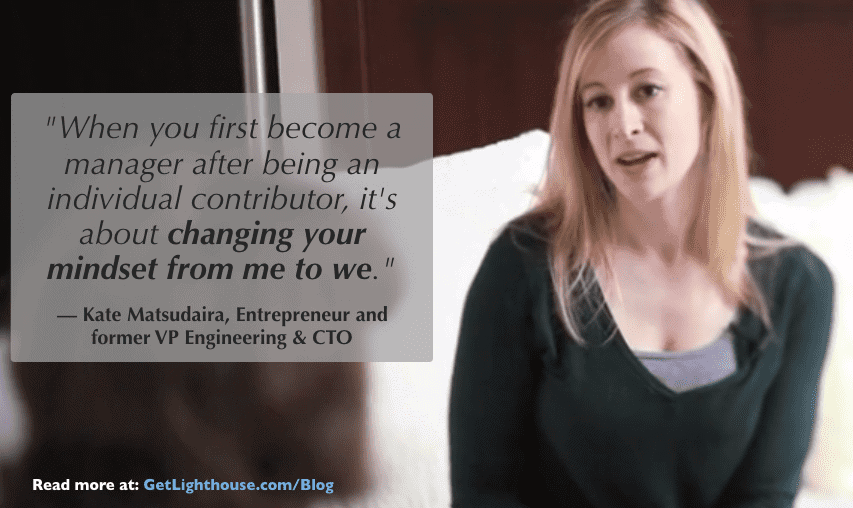
3) "Mentoring new hires is critical."
You spend all this time and money trying to find someone to hire, and then many companies drop the ball; if you don't put the effort in to onboard someone quickly and effectively, you'll waste the talent you fought so hard to find.
As Camille Fournier puts it:
"Your job as a new hire mentor consists of onboarding, helping this person adjust to life in the company effectively, and building your and her network of contacts in the company."
What's great about this is you don't have to be a manager to do new hire mentoring. In fact, it can be best to have your last hire mentor the newest.
Fournier recommends that you create onboarding documents to bring consistency to the process. Then, if you follow the pattern of people mentoring the next hire after them, it can become a living document, constantly evolving and improving as you grow.
Meanwhile, if you've delegated to your team mentoring new hires, you as a manager can focus on a clear set of goals. She suggests you make a 30/60/90 day plan that makes clear what they need to do to succeed. This then makes it easy to quickly identify bad hires and make it clear why they didn't work out.
Further Reading:
- When you start managing someone new, here are some questions to ask new team members
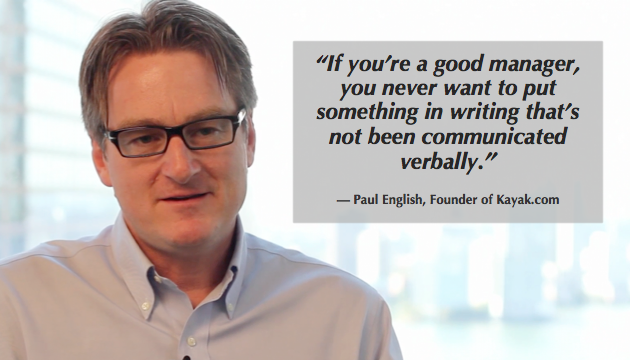
4) "Feedback works best when you, as a manager, pair that feedback with coaching."
One of the most important things you do as a manager is give feedback to your team. It helps them improve, fixes problems, and sets a clear standard of the work you want to see.
As we've discussed on the Lighthouse blog many times before, quality feedback is a key to great performance, and when mixed with praise, boosts engagement. Camille Fournier reinforces this concept when she wrote:
"When they believe that their manger sees the good things they do, they'll be more open to hearing about the areas where they might improve."
This feedback extends to performance reviews.
Done well, they're an opportunity to identify patterns for improvement, and set clear expectations of your people. Just like the best praise is specific, your reviews should be, too.
Fournier shares a key rule for making your reviews effective:
"If you can't use a concrete example to support a point, ask yourself if the point is something you should be communicating in the review."
When you are an individual contributor, you can largely focus on just yourself. When you become a leader, you have to start thinking about others. Providing great feedback and praise is one of the most important things you can do.
Further Reading:
- Looking for ideas how to give better feedback to your team? Here's how.
- Want to learn how the best people give praise to their team? Start here.
- Thinking a "real-time feedback" system is the answer? Here's why you should think again.
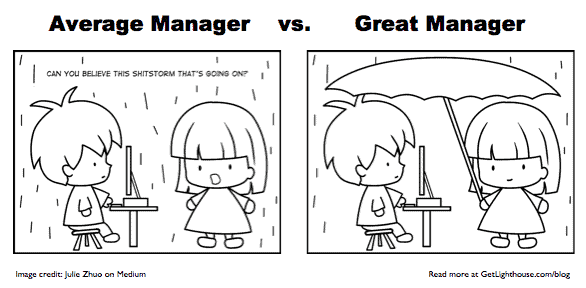
5) "It's unrealistic to think you can or should shield your team from everything."
A common piece of advice for manager's is to shield their team. To some extent, this is very good advice. Letting everything pass you and dump on your team creates a lot of unneeded stress and distraction for your team.
Camille Fournier adds some helpful nuance to this rule in her book:
"Sometimes it's appropriate to let some of the stress through to the team. The goal is not to stress them out but to help them get context into what they're dealing with.
...humans usually need some sort of context into why these goals have been set, and thereby into what problems they're working to solve."
Shielding your team from politics and unproductive drama can be a very good thing.
However, as Fournier highlights, helping them understand key situations can be a time when you should not shield them. They are likely to be more motivated when they have context, and can be more helpful in fixing problems.
As Fournier reminds us, "you are not their parent." Treat your team like adults and include them in key decisions and challenges, and you'll strike a much better balance for when to shield them.
Further Reading:
- Dealing with politics or internal problems? Here's how to overcome the dangerous learned helplessness where shielding is key.
- Communication and problems are a two way street. Here is a post on how to ask for feedback from team members.
There are many more excellent lessons in Camille Fourner's book, The Manager's Path. If you're looking to understand the path from individual contributor to senior leader, and how to be effective every step of the way, this is an excellent read.

